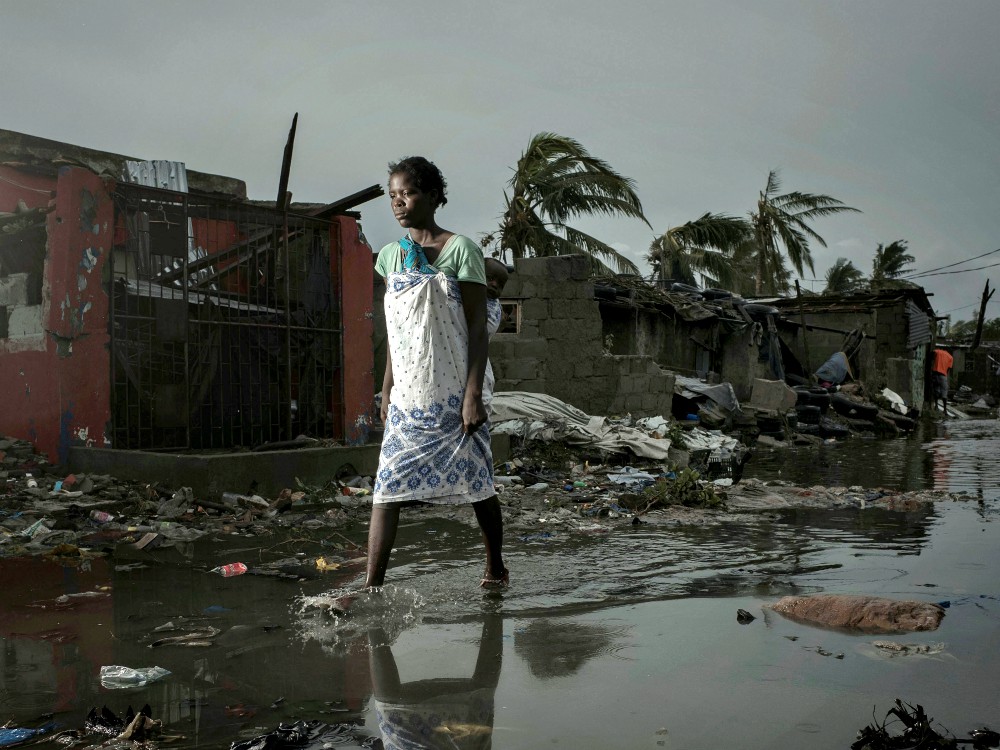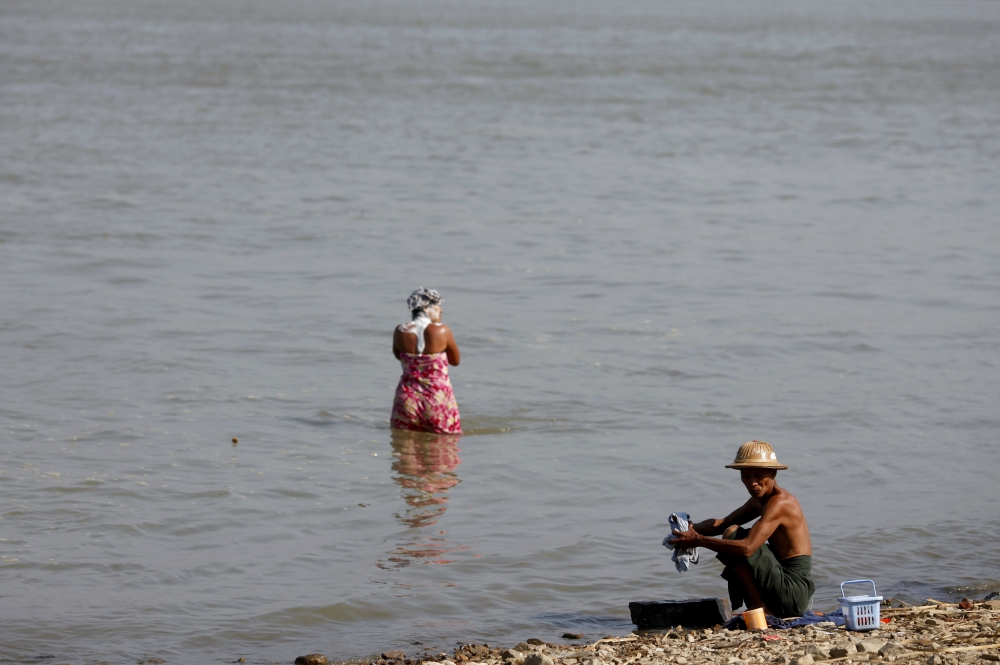
A young woman walks through floodwaters March 17 in the aftermath of Cyclone Idai in Beira, Mozambique. More than 600 died in Mozambique after a cyclone slammed into the country, submerging entire villages and leaving bodies floating in the floodwaters. (CNS/Reuters/Care International/Josh Estey)
Although Africa is among the regions contributing the least to global warming, the continent is one of the hardest hit by the impact of climate change on agriculture, health and water.
Convening in New York at the Dec. 11-13 Religions for Peace summit, African leaders called on the organization and its members to do more to help address the crisis.
Spiritual leaders and delegates from across the globe discussed joint action on climate conservation at a Dec. 11 session on "Partnership for Environmental Stewardship and Climate Protection."
A delegate from Senegal told panelist Charles McNeill of the United Nations Environment Program (UNEP) that Africans are "the least responsible and the least informed" when it comes to combating climate change, due to larger issues like "putting food on the table."
He called for greater involvement of religious leaders in persuading more people to do their bit to counter climate change.
McNeill, UNEP's senior adviser on forests and climate, pointed to the work being done in the Democratic Republic of Congo, where people are taking steps to protect the Congo Rainforest — the second largest after the Amazon in Brazil.
"I really appreciate the comment that the African people are, in spite of the fact that they're hurting the most… they are engaging and turning it around," said McNeill.
Since 70% of the population in Congo depends on the forest for day-to-day resources, a delegate from Kenya said there's an urgent need to find sustainable alternatives to fuel, so that there's less cutting of trees. With the alarming deforestation in the Amazon, environmental and religious groups also fear large-scale deforestation in Congo.
"It's a matter of investments in payment for ecosystem services," said McNeill. "It's a matter of renewable energy, the technologies exist to replace the dependence on pure wood. It's entirely doable."
Praising religious groups for their work in these areas, he added: "And of course, health and education need to be addressed as well to deal with development challenges."
Panelists at the session included women spiritual leaders, Marie-Josée Tardif, elder of the Anicinape (Algonquin) tradition in Canada; Laura Vargas, country facilitator of Interfaith Rainforest Initiative, Peru; and Priestess Beatriz Schulthess, president of the Indigenous Peoples Ancestral Spiritual Council, Costa Rica.
Vargas said that religious people need to make clear that "our planet is sacred."
"We have to have a new reverence for all the life that the planet is offering us," she said." The whole system is one of greed and arrogance of the powerful. We need to join our efforts."
Although there are many protective initiatives in place, Vargas said they were not enough because the risk currently is "very high."
Advertisement
"We can join efforts and declare this the decade of hope, the decade of reverence for life," she said, while calling on spiritual leaders to collaborate more.
Tardif said that the "wise people of the First Nations" have been trying to warn mankind of the dangers of "destroying the Earth."
She narrated a Native American prophecy to highlight the need to co-operate and save the planet:
"One day, they said — after very long years of difficulty — the white man will come knocking on our door. Having lost his balance, he will ask us to talk to him about our vision of the world, our relationship to the Earth, and the cosmos. Then will come a great time of reconciliation between our peoples. And if the white man makes the right choices, there will come a time of great reverse."
This reverse, according to Tardif, is undoing the damage done to the Earth. Despite the measures taken to combat climate change, the first people believe these measures are not enough because there is no "change of heart."
"This is where spiritual teachers can work hand-in-hand with representatives of business, science and academic world," said Tardif.
Also present at the summit was Cardinal Charles Bo of Myanmar. Speaking to NCR on the sidelines of the panel, Bo said he hoped the Catholic Church in the U.S. divests from fossil fuel.
"Instead of using petroleum, they should move towards alternative [sources] like solar energy, like they're doing in many countries now," he said.
When asked if the church in Myanmar has divested from fossil fuel, Bo said that the smaller countries need "the support of the Catholic Church and richer countries" to help in making the shift to sustainable energy sources.

A man washes clothes and a woman washes her hair along the bank of the Irrawaddy River in Sagaing, Myanmar in 2012. (CNS/Reuters/Soe Zeya Tun)
Myanmar is the poorest country in Southeast Asia and much of its struggling economy depends on the fossil fuel industry.
Bo said he was happy with the U.S. Conference of Catholic Bishops' response to climate change so far, and wished to see them "do more to protect the planet."
Myanmar is extremely vulnerable to climate change, and is often ravaged by cyclones, droughts and floods.
It was during Cyclone Nargis in 2008 that the Catholic church in Myanmar realized the havoc climate change can wreak on smaller nations.
"That [cyclone] took away [the] lives of more than 150,000 people," Bo said. "We became aware of climate change. Today, in kindergarten, children are being taught in the form of song and in the form of plays that climate change is affecting the people."
He argued that smaller nations have been doing a lot more to counter climate change than "rich and powerful countries."
He added, "Countries like U.S. and China need to be more proactive. Cutting down of trees to set up more factories is harmful. Smaller countries suffer the most."
He said the Catholic Church in Myanmar works alongside the government to raise awareness and plant more trees. "[Burmese] people are not using firewood in boarding houses anymore. We look for substitutes like solar energy or cooking with the husk. We take it very seriously."
"Pope Francis' Laudato Si' is a very good guide for Catholics to follow. It has been translated in English, Burmese — it can reach a lot more people," he said.
[Sarah Salvadore is an NCR Bertelsen intern. Her email address is ssalvadore@ncronline.org. Follow her on Twitter @sarahsalvadore.]








